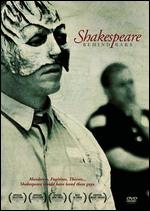FILM NOTES
FILM NOTES INDEX
NYS WRITERS INSTITUTE
HOME PAGE

Directed by Hank Rogerson
(United States, 2005, 93 minutes, color, DVD)
The
following film notes were prepared for the New York State Writers
Institute by Kevin Jack Hagopian, Senior Lecturer in Media Studies
at Pennsylvania State University:
It's maybe the most remarkable resident acting company in the world. If you're seeing their performance of The Tempest, you're either among the very fortunate -- or among the doomed. Because this is the Luther Luckett Correctional Center, a medium-security prison in LaGrange, Kentucky, and this cast is here for the longest run you can imagine.
For seven years before The Tempest, Curt Tofteland had overseen Shakespeare Behind Bars as an offshoot of the Kentucky Shakespeare festival. Shakespeare Behind Bars is director Hank Rogerson's documentary of Tofteland's prison production of The Tempest in its nine-month gestation, from its first workshops through its performance.
In Shakespeare Behind Bars, Luther Luckett seems like one of the last prisons in America openly dedicated to the principle of reform instead of Old Testament punishment. Its warden can be heard saying, "I'm a warden who hates prison." No more than his charges, who are up the river for crimes as serious as murder, armed robbery, and sexual abuse of minors. It's a prison designed for 400 inmates, now straining to hold more than 1,100 men. By turns antiseptic and dank, always pregnant with the possibility of erupting violence, Luther Luckett is as Off-Broadway as it gets.
Yet here is where the cathartic power of emotion on stage which is theater at its most useful finds transcendent expression. The Tempest's island becomes Luther Luckett, its diverse and often bitter characters forced into the kind of proximity that can only breed death or redemption. The cast of the play within the film intensely, even dangerously, identifies with the parts they play; The Tempest's allegory for the human condition has perhaps never been so keenly felt by a cast. There is Big G, a cop-killer, as Caliban, Red as Miranda, Sammie Byron as Triculo, the Jester and a con named Bulldog is Ariel. This is so spiritually Elizabethan a cast that Shakespeare would recognize them immediately. Hal, a thoughtful killer, is Prospero, and when he thunders, "We are such things as dreams are made on," we get it, too. God, do we get it.
The inmates' dedication to the project is real and unforced. "This ain't Mary Poppins," growls one man, in what must be the understatement of the decade, and they treat this expenditure of their time, the last resource of freedom they have left, as a matter of great consequence. They're only allowed to rehearse twice a week, and they've been known to lose cast members to solitary confinement, and a lucky few to parole. But the experience has proven so transformative, and so unifying, that some parolees have voluntarily stayed in prison long enough to finish their work on the show.
Shakespeare Behind Bars doesn't allow for much sentimentalizing. These men are violent criminals. No one protests his innocence, and the experience of making epic art clearly doesn't fully remake these gnarled souls. Rogerson preserves his own moral and ethical ambivalences toward the men of Luther Luckett in this film: "I was constantly struggling with questions such as: Should we rehabilitate criminals? How does art transform the human conscience? Do these men deserve any chance at recovery? What does it mean to forgive, and why do we do it?" Shakespeare Behind Bars shows that forgiveness is more than merely noble; it may well be at the center of what it means to be human. The Tempest is a play about forgiveness. In Shakespeare Behind Bars, we see men like Leonard Ford, playing Antonio, whose capacity for forgiveness -- of themselves, of others, even of the penal system that contains their winged souls in identical blocks of steel, glass, and tile -- exactly matches their capacity for violence.
This story of the power of art won't dissolve the cynical satisfaction some gain from imagining the misery of others as well-deserved. When The New York Post reviewed the film in March, 2006, the paper felt it necessary to editorialize in its own inimitably asinine style: smirking at the articulateness of the prisoners, suggesting the therapeutic power of this work is exaggerated by inmates scheming for sympathy, and using the opportunity to seek compassion for corporate criminals like Enron's Kenneth Lay.
But of course, it is to melt such deep-set cruelty that The Tempest was written. "Our revels are now ended," goes a lament from The Tempest, and inevitably, the show ends and Tofteland leaves Luther Luckett, while the cast members are left alone in this most tragic of darkened theaters. But this film leaves us with considerable hope that when this show closes, and the doors of the cell block at Luther Luckett thunder shut, a window has opened in the hearts of men.
— Kevin Hagopian, Penn State University
For additional information, contact the Writers Institute at 518-442-5620 or online at https://www.albany.edu/writers-inst.
 Shakespeare Behind Bars
Shakespeare Behind Bars